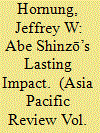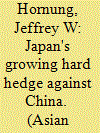| Srl | Item |
| 1 |
ID:
179531


|
|
|
|
|
| Summary/Abstract |
Abe Shinzō’s long duration in office brought to Japan strategic vision, international respect, and a forward-leaning commitment to strengthen Japan’s defenses and uphold the major tenants of the international order. This article examines Abe’s achievements in the security and foreign policy domains. Specifically, it examines his domestic achievements in establishing the National Security Strategy and National Security Council, reinterpreting Japan’s ability to exercise its right to collective self-defense, passing a suite of security legislation, and strengthening of Japan’s Self-Defense Forces. It also examines Abe’s foreign policy achievements of increasing Japan’s international presence and global role, expanding Japans’ strategic ties, creating and exporting a strategic framing vision called the Free and Open Indo-Pacific, and helping to establish the grouping of four maritime democracies called the Quad. The article argues that Abe’s desire for Japan to play a larger, more proactive role helped leave Japan—and the region—in a stronger place.
|
|
|
|
|
|
|
|
|
|
|
|
|
|
|
|
| 2 |
ID:
145762


|
|
|
|
|
| Summary/Abstract |
After months of contentious debate, Japan's parliament, called the Diet, in mid-September 2015 finally passed the Shinzo Abe government's package of eleven bills on security.1 This legislation, along with the revised U.S.–Japan Defense Cooperation Guidelines of April 2015, will transform the legal and institutional framework for Japanese defense policy and U.S.–Japan security relations.2 Japanese proponents of this transformation have argued the changes are necessary to make bilateral security cooperation more seamless to respond effectively to new regional and global security challenges and to contribute more proactively to international security affairs. Opponents, however, have charged that the legislation illegitimately hollows out Article 9 of Japan's constitution—which outlaws war as a means to settle international disputes—and could embroil Japan in misguided wars launched by the United States.3 Chinese and Korean critics of the legislation have echoed these criticisms by claiming that Japan is now remilitarizing.
|
|
|
|
|
|
|
|
|
|
|
|
|
|
|
|
| 3 |
ID:
133089


|
|
|
|
|
| Publication |
2014.
|
| Summary/Abstract |
As China accumulates more power, Japan is often overlooked as being capable of affecting China's continued trajectory because of material differences and narratives of Japan being a reactive state. Yet, Beijing's strategic planning cannot ignore Tokyo because Japan has the ability to affect the region's security environment. Feeling its presence and influence becoming relatively smaller, Tokyo has been increasingly proactive in its effort to expand its strategic space and shape the regional environment in ways conducive to its interests. A review of Japan's approach to China since 1972 reveals that it has shifted away from its traditional engagement policy toward first a soft hedge, followed by a harder hedge that continues to this day. Today's mix of partnerships and capabilities enable Japan to complicate China's freedom of action and frustrate its continued rise.
|
|
|
|
|
|
|
|
|
|
|
|
|
|
|
|